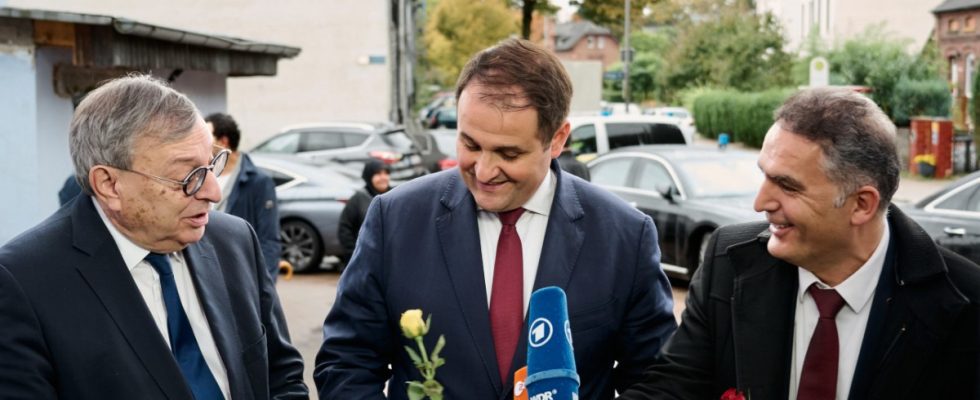The believers were able to wipe off some traces. They laboriously scrubbed away the two Stars of David and the swastika that unknown people scrawled at night twelve days ago on the side entrance to the Turkish-Islamic Mosque in Bochum-Dahlhausen. But the brownish burn marks on the plastic blinds are still there. Just like the fear that plagues many Muslims in this working-class district when they come to Eiberger Strasse to pray.
The mosque, a former pub, is not a magnificent building. The lilac-colored building shows holes in the plaster and the light inside the conference hall remains dim. But this is exactly where representatives of Jewish and Muslim associations met on Friday morning to assure each other of support and compassion – while new images of terror and war between Israel and the Palestinians come from the Middle East every day.
The head of the Central Council of Muslims in North Rhine-Westphalia regrets that Jews have to be afraid
“The situation is highly emotional,” warns Nathanael Liminski. The North Rhine-Westphalian State Minister brought both sides together; and at the beginning of the almost two-hour dialogue, the CDU politician even expressed hope. “We speak plainly to each other, it pays off,” he tells the journalists who are waiting outside in the drizzle. “So this crisis may also offer an opportunity for cooperation in our country.”
Later, towards the end of their encounter, Jews and Muslims talk primarily about each other’s suffering. Abraham Lehrer, head of the Cologne synagogue community and vice president of the Central Council of Jews in Germany, was the first to condemn the attempted arson attack in Bochum. “Desecrating a place of worship is always a terrible thing.” And Samir Bouaissa, the chairman of the Central Council of Muslims in North Rhine-Westphalia, regrets that Jews in Germany no longer dare to wear their kippahs in public: “Just as we want Muslim women to be able to walk across the street unmolested with a headscarf – that’s exactly how we want them We want Jewish people not to be harassed for living their faith.”
Brownish burn marks on the plastic blinds of the Turkish-Islamic Mosque in Bochum-Dahlhausen.
(Photo: Christian Wernicke)
It is also Bouaissa who sums up the meaning of this still very new dialogue: “Those who know each other learn to value each other.” Jewish and Muslim children in Germany should “perceive themselves as brothers and sisters, not as enemies.” The association representatives of both religions are meeting for the second time this week: Just on Monday, the representatives of the four largest Muslim associations in the state visited the old synagogue in Cologne to send a signal against the terrorist attacks by Hamas on October 7th.
This attempt, which is probably unique in Germany, began in North Rhine-Westphalia almost two weeks ago. After a meeting with Minister Liminski in the Düsseldorf State Chancellery, the Muslim religious communities castigated “the atrocities of Hamas” and demanded that all hostages be released immediately. In a statement, they also protested against “Hamas’ terrorist attacks on our streets be applauded or even just put into perspective.”
Abraham Lehrer hopes for a “jolt” that will go through society
On Friday, Muslims again pledged to spread this message among their believers. Durmuş Aksoy, the head of the Ditib communities in North Rhine-Westphalia, also promised this. The Ditib association is financially dependent on Ankara’s religious authority Diyanet; When asked about President Recep Tayyip Erdoğan, who praised Hamas as a “liberation organization,” Aksoy evaded: “We don’t do politics, we are a religious community.” The much-noticed statement from NRW cannot yet be found on the Ditib website – but, says Aksoy, “that’s theory – we’re doing the practical thing.”
Abraham Lehrer wants this message to reach the mosques. Just as he hopes that the pro-Israel stance of high German politics will reach the entire population. In the past, after attacks or terrorism, there were fairy lights – or actions such as wearing the yarmulke in public. “We miss that so far,” says Lehrer, “we miss this push from German society.”

